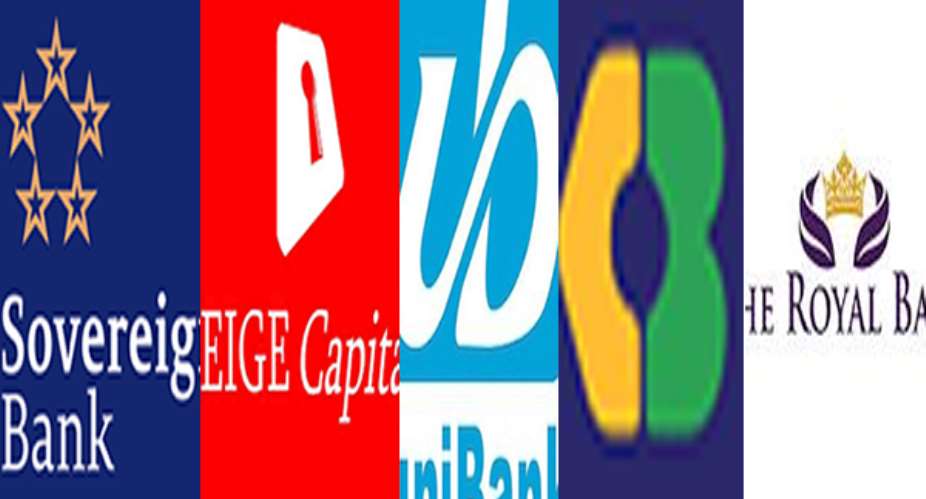Sources at the Economic Organised Crimes Office (EOCO) have told Joy News that the investigative body has begun a formal probe into circumstances which led to the collapse of five indigenous banks.
The banks – The Royal Bank, Beige Bank, Construction Bank, Sovereign Bank and uniBank – were merged to form the Consolidated bank earlier this month by the Bank of Ghana.
The sources told Joy News' Joseph Opoku Gapko that EOCO has been scrutinising a report from the BoG into the activities of the banks and have identified specific individuals whose activities led to the collapse of each bank.

Five Managing Directors of the dissolved banks: L-R: Stephen Kpordzih (Construction Bank) Osei Asafo - Adjei (Royal Bank) Dr Duffuor II (uniBank), Johan Rheeder (Sovereign Bank ), Mike Nyinaku (Beige Bank)
They have therefore issued letters to these persons formally, inviting them to show up at EOCO this week for interrogations to begin on the role they played in the collapse of their banks.
Officials at EOCO and the lawyers of these individuals are in talks to decide the day and time for their appearance.
This new probe is separate from what they [EOCO] have already done and concluded as far as the collapse of Capital and UT banks is concerned.
The latest merger brings to seven, the total number of banks that have collapsed since 2017 after UT bank and Capital bank were dissolved .
Detailing events that led to the merger of the banks, Governor of the Central Bank, Dr Ernest Addison told the media that the banks were struggling to remain solvent.
In the case of Sovereign Bank, the Governor revealed that directors of the bank used dubious means to obtain their license.
Dr Addison also said Beige and Construction Banks used fictitious and non-existent capital to obtain licenses. The banks, therefore, obtained licenses under false pretenses.
According to the BoG, the Consolidated Bank Ghana Limited has assumed selected assets and liabilities of the five banks with immediate effect.
Activities of some of the directors and shareholders of these collapsed banks were also a contributing factor to the collapse of the banks.
In the case of uniBank, the Official Administrator appointed in March 2018 found that the bank is beyond rehabilitation.
Shareholders, related and connected parties had taken amounts totaling GH¢3.7 billion which were neither granted through the normal credit delivery process nor reported as part of the bank’s loan portfolio.
Related: Collapsed Banks: Depositors cash not for wives, children - Finacial experts push for prosecution
In addition, amounts totaling GH¢1.6 billion had been granted to shareholders, related and connected parties in the form of loans and advances without due process and in breach of relevant provisions of Act.
Altogether, shareholders, related and connected parties of uniBank had taken out an amount of GH¢5.3 billion from the bank, constituting 75 percent of total assets of the bank.
In the case of Royal Bank, an on-site examination conducted by the BoG on 31st March 2018 revealed a number of irregularities.
Its non-performing loans constitute 78.9 percent of total loans granted, owing to poor credit risk and liquidity risk management controls.
A number of the bank’s transactions totaling GH¢161.92 million were entered into with shareholders, related and connected parties, structured to circumvent single obligor limits, conceal related party exposure limits, and overstate the capital position of the bank for the purpose of complying with the capital adequacy requirement.





 We’ll protect state wealth from opaque deals – Prof Jane Naana
We’ll protect state wealth from opaque deals – Prof Jane Naana
 Mauritania president says running for second term in June polls
Mauritania president says running for second term in June polls
 I won't ever say I was a mere driver’s mate' — Prof. Opoku-Agyemang
I won't ever say I was a mere driver’s mate' — Prof. Opoku-Agyemang
 2024 polls: 'EC struggling to defend credibility'— Prof. Opoku-Agyemang
2024 polls: 'EC struggling to defend credibility'— Prof. Opoku-Agyemang
 Akufo-Addo gov't's 'greed, unbridled arrogance, unrestrained impunity, sheer dis...
Akufo-Addo gov't's 'greed, unbridled arrogance, unrestrained impunity, sheer dis...
 Election 2024: Ghana needs an urgent reset, a leadership that is inspiring – Ma...
Election 2024: Ghana needs an urgent reset, a leadership that is inspiring – Ma...
 Partner NDC to rollout a future of limitless prospects – Prof Jane Naana Opoku-A...
Partner NDC to rollout a future of limitless prospects – Prof Jane Naana Opoku-A...
 NPP will remain in gov’t till Jesus comes — Diana Asamoah
NPP will remain in gov’t till Jesus comes — Diana Asamoah
 Sunyani Technical University demands apology from former SRC president over sex-...
Sunyani Technical University demands apology from former SRC president over sex-...
 'Dumsor' was resolved by Mahama but ‘incompetent' Akufo-Addo has destroyed the g...
'Dumsor' was resolved by Mahama but ‘incompetent' Akufo-Addo has destroyed the g...
